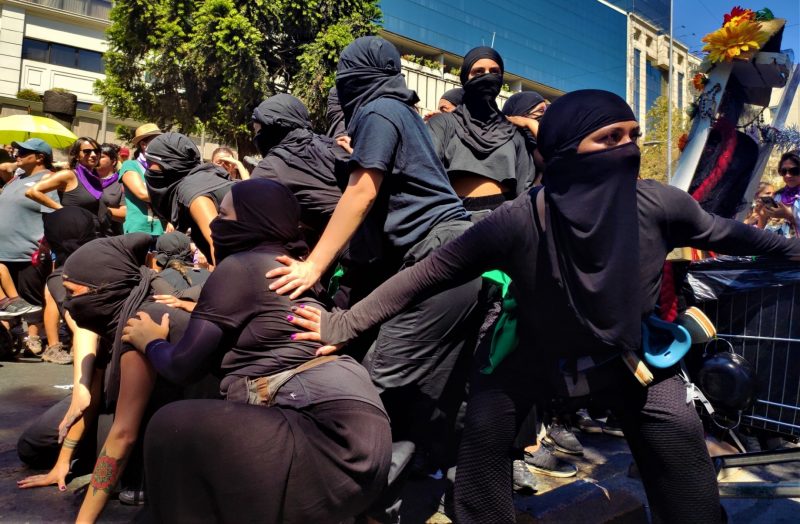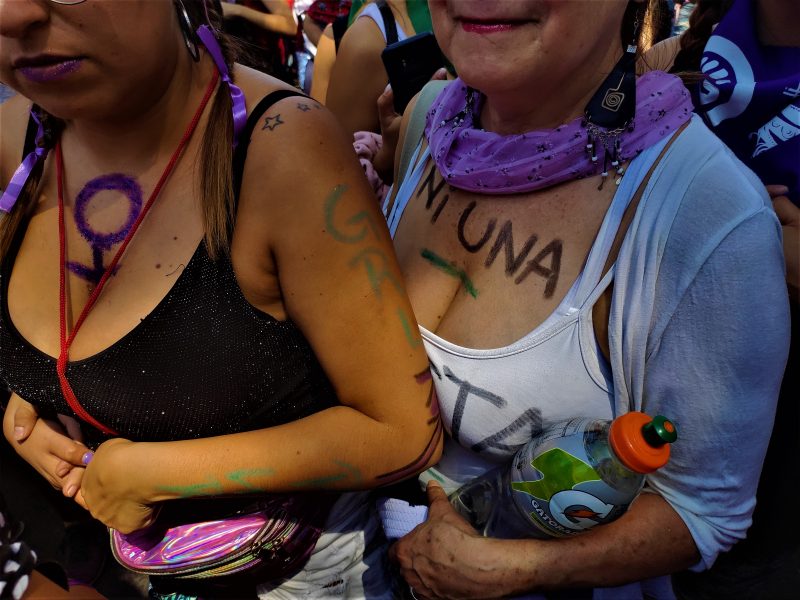
Performance during the Women's demonstration on March 8 in honor of women victims of femicides. Photo by Gabriela Mesones Rojo.
Check out Global Voices’ special coverage of how women fight gender violence in Latin America.
On March 8, an overwhelming number of women attended the International Women's Day marches in Chile. According to the organizer, Coordinadora Feminista 8M (the 8M Feminist Coordinator), 2 million people demonstrated in cities across the country, while the police estimated 150,000 attendees.
Of the thousands who marched from several points in Santiago de Chile to Plaza Dignidad, there were three friends, aged 19, 20 and 30, with their faces covered with pink hoods. They said to Global Voices:
Estamos cansadas de los abusos, la violencia constante. Todo lo que hacemos lo cuestionan, encontramos obstáculos una y otra vez solo para vivir una vida normal. Se acabó, ya no tenemos miedo.
We are tired of the abuse and constant violence. Everything we do is called into question, we face obstacles again and again just to live a normal life. It is over, we are no longer afraid.

One of the three hooded women interviewed. Photo by Gabriela Mesones Rojo.
All three women openly discussed how they have been victims of sexual abuse, and how they managed to get out of this situation and recover from the experience thanks to other women:
Otras mujeres fueron las que nos escucharon, nos creyeron, entendieron la magnitud del problema y nos ayudaron a salir de él. Por eso estamos juntas.
Other women were the ones who listened to us, believed us, understood the extent of the problem and helped us overcome it. This is why we are together.
The march covered a route of more than 4 kilometers and the surrounding streets, and featured live music, theater performances, literature readings, visual art, and dance for more than six hours. Allison Garrido, 13, holds a banner with the words “no more abuse, but more equality.” Her mother, Jenny Molina, 37, accompanied her with a placard which reads that she is marching for her daughter. It is the first time they attend a demonstration and they decided to participate after witnessing the October 18 protests.

Mother and daughter march together. Left sign: “I want my daughter to be safe when she comes back home”; Right sign: “I want my mother not to worry when I go back home.” Photo by Gabriela Mesones Rojo.
On March 8, President Sebastián Piñera announced that he sent two draft bills to Congress that would help protect women's rights. The first establishes telematic monitoring of men charged with domestic violence, and the second incorporates child support debtors into the commercial information bulletin (currently in Chile, 84 percent of fathers obligated to pay alimony fail to do so.)

Women's demonstration on March 8. Photo by Gabriela Mesones Rojo.
Women who were political prisoners during the US-backed Pinochet dictatorship also joined the march. For example, Amelia Negrón, 67, is one of the representatives of the Coro Voces de la Rebeldía (“Voices of the Rebellion Choir”), a choir founded in the Tres Álamos concentration camp in 1975. Wearing a red flower in her hair, she explained that:
Las mujeres siempre hemos estado presentes desde todas las trincheras: en los sectores populares, en las cárceles, las casas y las calles. Ahora nos parece fantástico que podamos contar con una asistencia masiva, una celebración por nuestros derechos.
We women have always been fighting on all fronts: in the civic sectors, in prisons, within homes and on the streets. Now it's great that we have a massive attendance at this march which is a celebration of our rights.

There have been 7 femicides claimed so far this year in Chile. Photo by Gabriela Mesones Rojo.
Along the route, the demonstrators stopped several times to jointly carry out the performance “Un violador en tu camino” (“A rapist on your path”), inspired by the feminist writings of Rita Segato made popular by the Chilean collective Las Tesis. The feminist anthem, which has been replicated globally, bares the sexist character of state institutions.
Several indigenous groups also joined the women's demonstration. On this occasion, the Mapuche women sang for the earth.

Mapuche women participated in the march. Photo by Gabriela Mesones Rojo.
On March 2, the central government enacted the Ley Gabriela (“Gabriela Law”), a new legal regulation that broadens the definition of the crime of femicide (seven completed femicides and 19 thwarted femicides have been registered by March 11 this year). According to this law, a femicide will be defined as a crime based on hatred, contempt or abuse on account of gender, and not only when it relates to spouses or partners as it was before.
In his presentation of the Gabriela Law, President Piñera stated that “sometimes, it's not just men's desire to abuse, but also the women's position to be abused.”
His comment was berated by the participants at the march. Mariana Álvarez, a Venezuelan migrant in Chile attending Red de Mujeres Afrodiaspóricas (the Network of Afrodiaspora Women), said:
Con estos comentarios queda claro que los recientes logros y los avances en las leyes que protegen a la mujer no son logros del presidente o del gobierno, son logros de las mujeres. A ellos no les importa proteger a nadie.
These comments make clear that recent legislative successes and progress that protect women are achievements of women, not of the president or the government. They don't care about protecting anyone.

Sign says: “As long as there's a single woman oppressed, I will not be a free woman.” Photo by Gabriela Mesones Rojo.
There were also vegan feminist groups attending the march. Antonia Mellado, 28, painted her naked body with red paint and held in her hands images of a battered cow. She explained:
Sostenemos que haya sororidad entre todas las especies, no solo la especie humana, sino también la animal. Llevo dos años siendo vegana porque los animales femeninos también están sujetas a una explotación llena de crueldad. Hoy también protestamos por esos animales y queremos que la nueva constitución proteja los derechos animales del país.
We believe that there is sorority among all species, not only within human species, but also within animal species. I have been a vegan for two years because female animals are also subject to cruel exploitation. Today we are also marching for these animals and we want the new constitution to protect the rights of the animals in this country.

Vegan women asking for “interspecies sorority”. Photo by Gabriela Mesones Rojo.
At the end of the March, police shot pepper spray on demonstrators. According to Berta Robles, police coordinator for the demonstration day, the disturbances resulted in 19 injured officers and 16 people detained.
Despite that, the demonstration was well-organized and had diverse attendees, according to Pía Barros, one of the founders of the Alternative Feminist Party of Chile:
La capacidad de las organizadoras fue espectacular. Poquísimos incidentes y una gran cantidad de mujeres disfrutando, consignas preciosas, creatividad y la naturalidad con la que la gente tomó las calles deja al descubierto de lo que somos capaces.
The competence of the organizers was spectacular. The very few incidents and a large number of women enjoying themselves, the wonderful slogans, the creativity and the natural way with which people took to the streets. This reveals what we are capable of.

The hood moms distribute food to the front line protesters during the Chilean social outbreak. Photo by Gabriela Mesones Rojo.
Marta Romero, a 23-year-old student, while walking away from the police repression taking place in front of Casa de Moneda, said:
Estuvimos por horas bajo el sol, disfrutando, cantando, abrazándonos, juntas como hermanas. Las mujeres tenemos voz, siempre la hemos tenido, pero ahora no tenemos miedo. Ahora están obligados a escucharnos.
We spent hours in the sunlight, enjoying ourselves, singing, hugging each other, being together as sisters. We women have a voice, we have always had, but now we are not afraid anymore. Now they have to listen to us.






